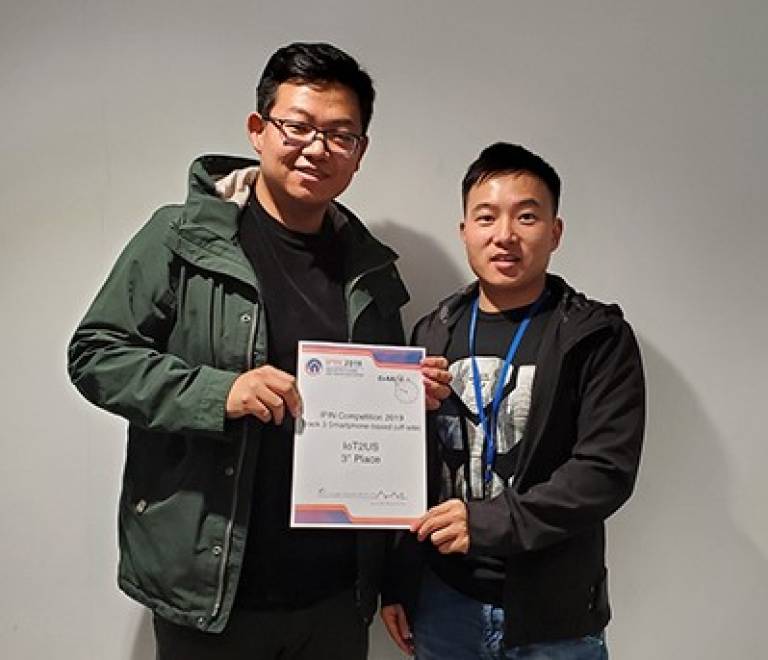Mobile localisation and tracking prize awarded to EEE PhD student
7 May 2021
The team, comprising a PhD student from the Department of Electronic and Electrical Engineering (EEE), University College London (UCL), and Queen Mary University of London (QMUL), won second prize worldwide for their research.

PhD student Chengqi Ma (Supervisor: Dr David R. Selviah), along with his counterparts at QMUL, won second prize in the competition adjudged at Indoor Positioning and Indoor Navigation (IPIN) conference. The research focused on mobile phone tracking in complex buildings and underground stations.
The conference paper detailing the research behind this feat has now been accepted by the IEEE Sensors journal with the article title 'Off-line Evaluation of Indoor Positioning Systems in Different Scenarios: The Experiences from IPIN 2020 Competition'.
Chengqi Ma had previously successfully developed and demonstrated novel algorithms for localisation and tracking of mobile phones in complex underground train stations[1] and buildings[2] by fusing data from several sensors onboard the mobile phone.
Background
In May 2019, UCL EEE began a research collaboration with Bang Wu (Supervisor: Dr Stefan Poslad) of the School of Electronic Engineering and Computer Science, Queen Mary, University of London (QMUL) on algorithmic development and experimental demonstration for localisation and tracking. They entered the 6th Indoor Positioning and Indoor navigation, IPIN, tracking competition[3] winning 3rd prize[4] and published their results[5]. In 2020, they entered the 7th Indoor Positioning and Indoor navigation, IPIN, tracking competition 2020[6] and this time won 2nd prize[7], on 14th December 2020.
The research team consisted of Chengqi Ma (UCL), Bang Wu (QMUL), David R. Selviah (supervisor, UCL), Stefan Poslad (supervisor, QMUL), Yonglei Fan (QMUL), Wei Zhang (SZU), Yankun Wang (SZU), Weixi Wang (supervisor, Shenzhen University, SZU). Their method combined Pedestrian Dead Reckoning with the use of Artificial Intelligence for recognition of the physical activity of the mobile phone user. In the competition “Track 3 – Smartphone”, a pedestrian walked for 20 minutes under realistic conditions through a multi-floor building, recording data from the sensors on a conventional smartphone. The challenge was to calculate the track of the person in 3D and the deviation of that track from the ground truth trajectory was used to grade the winners. There were 11 competition entrants, large teams of researchers from international universities, labs, and companies. It is a significant mark of success that the joint UCL/QMUL team were awarded second prize. This is a better result in a more difficult competition than set the previous year, with a much-improved accuracy reducing from 2.50 m to 1.72 m.
1. Ma, Chengqi, Chenyang Wan, Yuen Wun Chau, Soong Moon Kang, and David R. Selviah. "Subway station real-time indoor positioning system for cell phones." In 2017 International Conference on Indoor Positioning and Indoor Navigation (IPIN), Sapporo, pp. 1-7. IEEE, 2017. doi: 10.1109/IPIN.2017.8115912.
2. Ma, Chengqi, Bang Wu, Stefan Poslad, and David R. Selviah. "Wi-Fi RTT Ranging Performance Characterization and Positioning System Design." IEEE Transactions on Mobile Computing (2020). no. 01, pp. 1-1, 5555. doi: 10.1109/TMC.2020.3012563. https://ieeexplore.ieee.org/document/9151400
3. http://ipin2019.isti.cnr.it/competition
4. http://evaal.aaloa.org/2019/competition-results
5. Potortì, Francesco, Sangjoon Park, Antonino Crivello, Filippo Palumbo, Michele Girolami, Paolo Barsocchi, Soyeon Lee et al. "The IPIN 2019 Indoor Localisation Competition—Description and Results." IEEE Access 8 (2020): 206674-206718. 6. 6. https://ieeexplore.ieee.org/document/9253514
6. http://ipin2020.beidou.org/index.php/category/competition
7. http://evaal.aaloa.org/2020/results
 Close
Close

